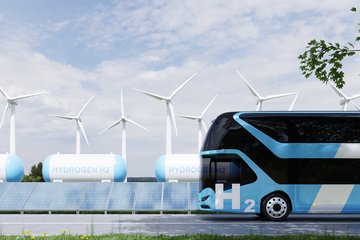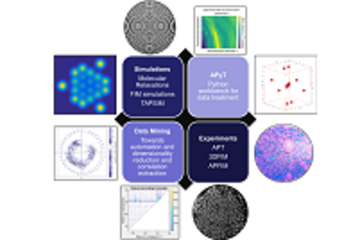All genres
2381.
Thesis - PhD
Microstructural characterization of white etching cracks in 100Cr6 bearing steel with emphasis on the role of carbon. Dissertation, RWTH Aachen University (2021)
2382.
Thesis - PhD
Machine learning methods in data-driven nanostructure analysis of materials. Dissertation, RWTH Aachen University (2021)
2383.
Thesis - PhD
Advancements in the understanding of Ir-based water splitting catalysts at the near-atomic scale. Dissertation, Ruhr-Universität Bochum (2021)
2384.
Thesis - PhD
Mechanisms of refinement and deformation of novel ultrafine-grained medium manganese steels with improved mechanical properties. Dissertation, Ruhr-Universität Bochum (2021)
2385.
Thesis - PhD
Multi-Phase-Field Modeling of Structure Formation in Metallic Foams. Dissertation, Ruhr-Universität Bochum (2021)
2386.
Thesis - PhD
Modeling of the microstructural effects on the mechanical response of polycrystals. Dissertation, RWTH Aachen University (2021)
2387.
Thesis - PhD
Precipitation during Intrinsic Heat Treatment in Laser Additive Manufacturing. Dissertation, RWTH Aachen University (2020)
2388.
Thesis - PhD
Investigations on the Mechanisms of Ductilization of Mg Alloys with Ca, Al and Zn. Dissertation, Ruhr-Universität Bochum (2020)
2389.
Thesis - PhD
Nanostructured cellulose aerogel reinforced polymers. Dissertation, Fakultät für Georessourcen und Materialtechnik der RWTH Aachen, Germany (2020)
2390.
Thesis - PhD
Nanostrukturierte Cellulose-Aerogel-Polyesterverbunde. Dissertation, RWTH Aachen University (2020)
2391.
Thesis - PhD
Microstructure alterations in bearing steels exposed to severe plastic deformation. Dissertation, RWTH Aachen University (2020)
2392.
Thesis - PhD
Design of materials with anomalous thermophysical properties and desorption-assisted phase formation of intermetallic thin films. Dissertation, RWTH Aachen University (2020)
2393.
Thesis - PhD
Microstructural Relationships of Strength and Ductility in a Newly Developed Mg–Al–Zn Alloy for Potential Automotive Applications. Dissertation, RWTH Aachen University (2020)
2394.
Thesis - PhD
Microstructural Relationships of Strength and Ductility in a Newly Developed Mg–Al–Zn Alloy for Po-tential Automotive Applications. Dissertation, RWTH Aachen University (2020)
2395.
Thesis - PhD
Precipitation Reactions During the Intrinsic Heat Treatment of Laser Additive Manufacturing. Dissertation, RWTH Aachen University (2019)
2396.
Thesis - PhD
Deformation behaviour and texture memory effect of multiphase nano-laminate medium manganese steels. Dissertation, RWTH Aachen University (2019)
2397.
Thesis - PhD
On the interfacial defect formation mechanism during laser additive manufac-turing of polycrystalline superalloys. Dissertation, Ruhr-Universität Bochum (2019)
2398.
Thesis - PhD
A study on low-cycle fatigue behaviour of high-manganese steels. Dissertation, RWTH Aachen University (2019)
2399.
Thesis - PhD
Segregation and precipitation at interfaces in a model Al–Zn–Mg–Cu alloy. Dissertation, RWTH Aachen University (2019)
2400.
Thesis - PhD
On the interfacial defect formation mechanism during laser additive manufacturing of polycrystalline superalloys. Dissertation, Ruhr-Universität Bochum (2019)











